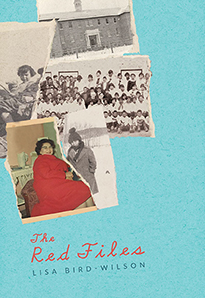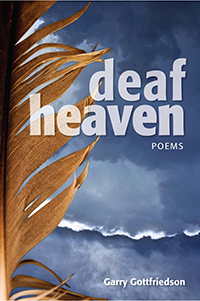Reviews
Poetry Reviews by Cara-Lyn Morgan
Lisa Bird-Wilson, The Red Files (Gibsons: Nightwood, 2016). Paperbound, 80 pp., $18.95.
Garry Gottfriedson, Deaf Heaven (Vancouver: Ronsdale, 2016). Paperbound, 114 pp., $15.95.
 The prevalent voice in Lisa Bird-Wilson’s The Red Files tells a tragic and relentless truth with unnerving quietness. The often harsh depictions of residential-school realities are described with a childlike innocence and the voice of retrospection, making them, at times, easier to digest while, in the space of a few lines, quickly becoming rough in the throat and chest. This short collection is delicate and aware, using an admirable restraint in both content and technique. It is seemingly always aware of its audience and the stories it is willing to tell. Like the past, though generous with some aspects, there is a subtle holding back which, whether intentional or not, speaks to the broader themes in poems like these. There is an air of secrecy threaded throughout the work, indicative of the treatment of Indigenous stories and history, still common today as well as with all difficult family stories. It is often harder to break through the nostalgia to the hard truths beneath. She goes so far as to even reproduce archival documents as found poetry, employing the black marks of censorship. The poems are both lyrical and visual, and the dialogue between these two aspects enhances the tension and overall experience of the book.
The prevalent voice in Lisa Bird-Wilson’s The Red Files tells a tragic and relentless truth with unnerving quietness. The often harsh depictions of residential-school realities are described with a childlike innocence and the voice of retrospection, making them, at times, easier to digest while, in the space of a few lines, quickly becoming rough in the throat and chest. This short collection is delicate and aware, using an admirable restraint in both content and technique. It is seemingly always aware of its audience and the stories it is willing to tell. Like the past, though generous with some aspects, there is a subtle holding back which, whether intentional or not, speaks to the broader themes in poems like these. There is an air of secrecy threaded throughout the work, indicative of the treatment of Indigenous stories and history, still common today as well as with all difficult family stories. It is often harder to break through the nostalgia to the hard truths beneath. She goes so far as to even reproduce archival documents as found poetry, employing the black marks of censorship. The poems are both lyrical and visual, and the dialogue between these two aspects enhances the tension and overall experience of the book.
Visual richness is, in fact, peppered throughout the poems, employing haunting imagery—“on prayer-bruised knees,” “shadow dappled panic,” and “legato fog-swept air”—which can cause a shiver as the reader encounters it. The poems, with their apparent softness, are disquieting, less accusatory than aware, pulling the reader in through storytelling and song. The collection, a series of memories, tragedies, ghost stories, and frank Canadian truths, is both chilling and charming, as it delves into a complex past through descriptions of photographs, government documents, and archived records. The author’s use of line-breaks ramps up the tension even more, injecting silence without being obvious, raising the discomfort without being isolating.
In “Beside a Residential School,” Bird-Wilson concludes with this ghostly rhyme: “singing the spirits home / a handful of buttons and bones.” This eerie, sing-song quality alludes to the things both said and tragically unsaid, harkening back to that thread of secrecy. Throughout The Red Files, the rhymes are scattered in the lines, recalling always the voices of children buried in the scatter of stories. Haunting, sorrowful and lovely, The Red Files takes us on a journey through mourning and grief, denial of history, demands for truths, and the curiosity for a history that has long been silenced, ultimately pressing on toward healing. It is an unsettling and beautiful read and Bird-Wilson tells her stories with ferocious grace.
 Garry Gottfriedson’s Deaf Heaven is a generous collection that is unforgiving and unapologetic. This book owns its anger, its frustration, its accusations. It bubbles hot under the skin. In these bold poems, Gottfriedson intertwines free-verse form, rich with a strong dialogue of resentment and unabashed distrust, with delicate haiku, drawing stunning images of nature overlaid with distinctly urban diction. He utilizes the space on the page as well, surrounding his words (often hard in their cadence and content) with white space and inherent silence. He uses the space masterfully, almost as a respite to the content, using couplets and short line stanzas to emphasize the brutality he is describing. The poet uses internal rhymes, repetition, and wonderfully hard-working couplets that challenge a reader to focus not only on the content but to delight in the mechanics of the writing. This collection harkens back again and again to the process of writing, calling into view the poet behind the narrative speaker.
Garry Gottfriedson’s Deaf Heaven is a generous collection that is unforgiving and unapologetic. This book owns its anger, its frustration, its accusations. It bubbles hot under the skin. In these bold poems, Gottfriedson intertwines free-verse form, rich with a strong dialogue of resentment and unabashed distrust, with delicate haiku, drawing stunning images of nature overlaid with distinctly urban diction. He utilizes the space on the page as well, surrounding his words (often hard in their cadence and content) with white space and inherent silence. He uses the space masterfully, almost as a respite to the content, using couplets and short line stanzas to emphasize the brutality he is describing. The poet uses internal rhymes, repetition, and wonderfully hard-working couplets that challenge a reader to focus not only on the content but to delight in the mechanics of the writing. This collection harkens back again and again to the process of writing, calling into view the poet behind the narrative speaker.
The forcefulness of this collection, though overwhelming on the first read, was gratifying with subsequent readings. This book speaks with the good kind of anger—an anger that is not sorry, that is collective and pointed, and runs beneath the surface of this country, threatening always to burst forward. His short poems are poignant and hard, but stunning. “Identity,” a haiku seated on the page, surrounded by white, says simply, “I am an old squaw / fighting for my lost manhood / with your stolen words.” A gut punch in three lines. After my first run-through, I found myself drawn back to various lines and images that somehow had softened after the first read. Or perhaps I had toughened up.
In “Poetry,” Gottfriedson says, “no, poetry is not for the dull / nor should be written so / there is meaning in seeing what can be seen / the veil must be lifted / when ink etches paper.” If poetry is a revolutionary act, as I have been told, then Garry Gottfriedson is fronting the battlefield.
—Cara-Lyn Morgan









